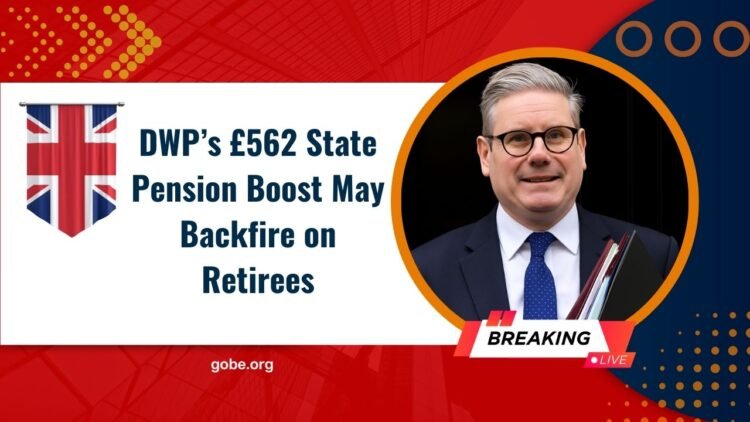State pensioners in the UK are set to receive an extra £562 next year under the Triple Lock arrangement announced by the Department for Work and Pensions (DWP). At first glance, this seems like a generous “free” boost.
However, many experts warn that while the headline number looks comforting, in practice rising costs, tax rules, and benefit thresholds mean many pensioners could end up worse off. In this article, we examine all the details, the risks, and how retirees might be caught in a trap.
What Is the Triple Lock and Why £562?
The Triple Lock system ensures the state pension rises each year by whichever is highest of:
- Average earnings growth,
- Inflation (CPI),
- 2.5% as a floor.
Recent wage data showed 4.7% growth in the period May to July 2025. Inflation (CPI) has held at 3.8% as of August 2025.
Thus, using the higher earnings figure, the new state pension is expected to climb from £11,973 a year to £12,535 (an increase of £562). The basic state pension (for older pensioners) will rise from £9,175 to £9,606, a boost of £431.
These figures are set to take effect in April 2026.
Key Figures & Details: Table
| Item | Current / Previous | Projected New Value | Increase / Notes |
|---|---|---|---|
| New State Pension (annual) | £11,973 | £12,535 | + £562 |
| Basic State Pension (annual) | £9,175 | £9,606 | + £431 |
| Earnings Growth Used | — | 4.7% | Highest of the triple lock inputs |
| Inflation Rate (CPI) | — | 3.8% | Reference point for comparison |
| Personal Allowance Threshold | — | £12,570 | The tax-free income threshold |
Why the £562 “Free” Boost Could Backfire
1. Rising Costs Eat the Gain
Experts say that food, housing, energy, insurance, and utilities are inflating faster than general inflation, meaning pensioners in lower-income brackets may see little to no net benefit. Baroness Ros Altmann warned that “further price rises will hit the lower income pensioners most.”Charlene Young (AJ Bell) also cautioned that those on the lowest incomes will struggle as energy and food costs eat into their gains.
2. “Fiscal Drag” and Tax Exposure
Because income tax thresholds have been frozen for years, any increase in pension income runs the risk of pushing pensioners into paying tax where they didn’t before.Once the new state pension edges above or near the personal allowance (£12,570), this becomes a real issue. In fact, by 2027, many relying solely on the state pension are expected to become taxpayers for the first time if the thresholds remain unchanged.
3. Not All Pensions Are Fully Protected
Millions of pensioners receive additional state pensions (e.g., SERPS or State Second Pension) that do not benefit from the triple lock — only the basic or new state pension part is protected. Many may find their SERPS portion unchanged, dampening the overall gain.
4. Loss of Other Benefits
Surprisingly, some pensioners may lose eligibility for other means-tested or income-capped benefits. For example, an inflated pension income may push them above benefit thresholds (e.g. for Winter Fuel Payment or other support). Indeed, 100,000+ pensioners are projected to lose up to £300 in winter fuel support next year due to their income being pushed just over eligibility caps.
What Experts Say
- Baroness Ros Altmann: She expects many pensioners will, in fact, be worse off even with the rise, because of the rapid cost escalation.
- Charlene Young (AJ Bell): Emphasises the vulnerability of lower-income pensioners who spend a large share of their income on essentials.
- Dennis Reed (Silver Voices): Warns pensioners are already below the poverty line; increases in utility bills and council tax have already eaten into previous gains.
- Steve Webb (former pensions minister, now with LCP): Highlights that this £562 boost may trigger income tax burdens and that the pension will soon surpass the tax-free allowance if the system continues as is.
What Pensioners Can Do
- Check every benefit entitlement — ensure you are claiming all support (e.g., pension credit, council tax relief).
- Monitor your total income — gauge whether tax thresholds might impact you.
- Plan withdrawals carefully from any private or additional pensions to avoid pushing yourself into higher brackets.
- Seek financial advice before making changes to your pension or investments.
While a headline figure of £562 extra from DWP seems like a welcome gift for state pensioners, the reality is more complex. Rising living costs, tax exposure, and benefit eligibility traps mean that many retirees may not feel any real improvement — and some could even be worse off.
The Triple Lock boost is not inherently harmful, but unless counter-measures (such as tax threshold adjustments or better protections) accompany it, the policy risks hurting the very people it intends to help.
FAQs
Will every state pensioner get the full £562 boost?
No. Only those receiving the new state pension and basic state pension portions benefit under the Triple Lock. Recipients of SERPS / additional pensions may not get full increases on those parts.
Could pensioners pay income tax because of this increase?
Yes. If the total pension income crosses the personal allowance (£12,570) — especially with frozen tax thresholds — a pensioner could begin paying income tax for the first time.
Can this increase affect other benefits I receive?
Yes. A higher pension income might push some pensioners above limits for means-tested benefits (like Winter Fuel Payment or pension credit), leading to a loss or reduction of those benefits.
